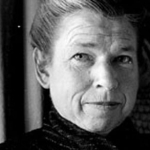When we go out into the fields of learning
We go by a rough route
Marked by colossal statues, Frankenstein's
Monsters, AMPAC and the 704,
AARDVARK, and deoxyribonucleic acid.
They guard the way.
Headless they nod, wink eyeless,
Thoughtless compute, not heartless,
For they figure us, they figure
Our next turning.
They are reading the book to be written.
As we start out
At first daylight into the fields, they are saying,
Starting out.
In every sage leaf is contained a toad
Infinitely small.
Carbonized grains of wheat unearthed
From the seventh millennium B.C. town of Jarmo
In the Tigris-Euphrates basin
Match the grains of three kinds of wheat still extant,
Two wild, one found only in cultivation.
The separate grains
Were parched and eaten,
Or soaked into gruel, yeasted, fermented.
Took to the idea of bread,
Ceres, while you were gone.
wind whistles in the smokey thatch,
Oven browns its lifted loaf,
And in the spring the nourished seeds,
Hybrid with wild grass,
Easily open in a hundred days,
And seeded fruits, compact and dry,
Store well together.
They make the straw for beds,
They ask the caring hand to sow, the resting foot
To stay, to court the seasons.
Basil: hatred: king over pain.
What did you do on the last day of day camp?
First we did games, running around and playing.
Then we did crafts, making things.
Then we did nature, what goes on and on.
Eventually a number
Of boys have got big enough
Through all the hazards of drag-racing, theft, and probation,
To start for junior college, two transfers away,
Mysterious as Loch Ness.
While of grandmothers a number
Have stooping arrived to seventy or eighty
And wave the boys on, shaking
With more absentminded merriment than they have mustered
In half a century.
King Henry the Eighth consumed many daisies
In an attempt to rid himself of ulcers.
Algebra written across a blackboard hurts
As a tight shoe hurts; it can't be walked in.
How far lies one note from another?
Graft hurts, its systems of exploitation
In cold continuance.
Argosies of design, fashions to which the keys
Rest restlessly in an Egyptian tomb.
In every sage leaf is contained a toad
Infinitely small.


















Comment form: